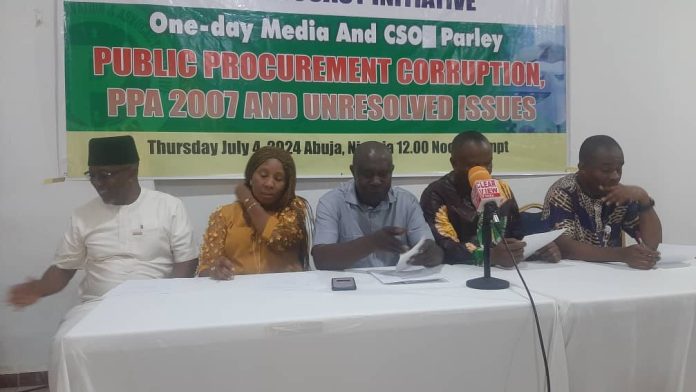By Blessing Otobong-Gabriel
Procurement Observation and Advocacy Initiative (PRADIN), has called on President Bola Ahmed Tinubu to review the public procurement Act enacted about 15 years ago, which is due for review in line with global best practices and changing operational dynamics in the public contracting sector.
The National Coordinator, PRADIN, Mohammed Bougei Attah made the call at the PRADIN one day media and CSO Parley with the theme public procurement corruption, PPA 2007 and Unresolved Issues.
Recalled that the Public Procurement Act 2007 was signed into law on 4th June, 2007 by the late President Umaru Musa Yar’ Adua.
The Act provides the legal and institutional framework for the enthronement of transparency, accountability, value for money and efficiency in the procurement of works, goods and services within the Ministries, Departments and Agencies.
PRADIN Coordinator lamented that public procurement in Nigeria has become an “anything goes” affair, saying that in its current form, the act encourages illegality.
Attah said, “for some of you that have followed us since the year 2010, you will observe that all our predictions and fears have come to pass, as though most were ignored. From President Umar Musa Yar’adua to Goodluck Jonathan, then to Muhammadu Buhari and now President Bola Ahmed Tinubu, the story remains the same but the situation is getting worse daily”.
He reecho the group regular observations that study by a member organization, NGO Network in September 2010 shows that Procurement Corruption (PC-as its now a phenomenon) alone accounts for over 70% of total corruption in the public sector.
According to him, despite the huge investments and resources in the fight against corruption human and materials over the years, the wastage continues and corruption, particularly in high places is on the increase. As a fact, PC is not only fighting back, it appears to be winning the way. It is believed that over $168n of our commonwealth has gone into wastages. And this is occasioned by corruption through abandoned projects in Nigeria.
“To analyze and project some of the reasons behind the ugly developments, let us draw our attention to a statement credited to the Chairman of the Economic and Financial Crimes Commission, EFCC, Barr. Ola Olukayode during a recent visit to the Commission by immediate past Director General of the Bureau of Public Procurement, BPP, Mr. Mamman Ahmadu that “The Public Procurement Act is not helping the Commission in the fight against corruption”
He said, the above statement isn’t only a huge indictment on the leadership of the BPP, but a confirmanon of lack of capacity to manage the responsibilities and mandates of the Agency
Attah informed that it is important at this stage to talk about the fundamental challenges confronting the administration of effective and efficient procurement process in Nigeria and these challenges are largely responsible for the high level of corruption and the unproductive nature of the BPP.
He said these challenges can be summarized into two main parts: lack of capacity and the disobedience to the rule of law.
The Parley is organized as an annual event to support the government’s efforts in the fight against corruption by way of providing insights into the challenges and way forward as it relates to procurement management and administration in Nigeria.
These include failure on the part of the Federal Government to constitute and inaugurate the National Council for Public Procurement as enshrined in Part 1, Section of the PPA 2007, lack of capacity by the erstwhile appointees that headed procurement and supply chain entities in Nigeria for the last 13 years, and failure and inability of the BPP to conduct Procurement Audit and submit the Report to the National Assembly bi-annually as required by law in Section 5(p) of the PPA 2007.
“While this Media and CSOs Parley is not meant to undermine any person or professional bodies in Nigeria, the effort rather is to support them and the federal government in this trying period of uncontrolled procurement corruption cases in the public sector. Also with President Bola Ahmed Tinubu’s Renewed Hope Agenda, he will be the first President to have acted swiftly by sacking the former”
This interface therefore is necessary as we have done in the cases of past administrations, as we also believe will also be valuable to the anti-corruption bodies, such as ICPC and the EFCC. It will in particular provide deeper understanding of the challenges faced by the bodies in tackling procurement corruption cases by understanding the extant laws and the applications.
“It is hoped therefore that President will follow this advice judiciously to avoid the pitfalls of his predecessors”.
Procurement Observation and Advocacy Initiative, PRADIN, is a select group of non-state actors trained under the World Bank-Federal Republic of Nigeria Economic Reforms and Governance Project 2010.





